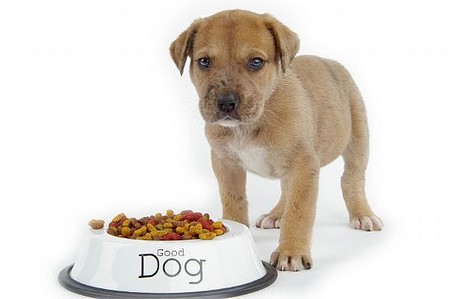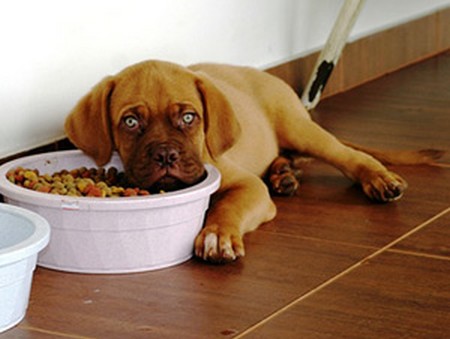How to Feed Your Dog
By Fred Goodson on Feb 08, 2010 with Comments 0
To maintain your dog’s good health, it is essential to feed him both a well-balanced diet and the right amount of it on a daily basis. There is a wide range of canine foods available, so it can be difficult deciding which variety or make is the best choice for your dog. There are, however, certain dietary nutrients that a dog cannot do without, as well as age, health and lifestyle considerations to take into account, and this makes the job of deciding on the most suitable diet much easier.
Eating habits
Dogs are omnivorous and can be kept on specially formulated vegetarian diets, although they do prefer meat-based foods. In a wild state the dog hunts, kills, feeds, then rests. He may gorge himself on a whole animal one day, then go without food for the next two or three; this is why many dogs eat until they are fit to burst – instinct tells them they may have to wait quite a while before their next meal.

Adult dogs are usually fed once a day, but splitting that feed into two meals adds interest. It is also better to feed certain deep-chested breeds (such as German Shepherd Dogs, Great Danes and Setters) several small meals rather than one big one, to avoid serious digestive ailments such as bloat (gastric dilation and volvulus).
Commercially produced clinical diets are available (usually only from vets), which can help dogs suffering from such diseases as kidney stones, senility, obesity, digestive disturbances, diabetes mellitus and tooth and gum problems. There are even foods specifically designed for long-coated breeds, as well as life-stage formulas. You can also choose from holistic diets that contain no artificial additives, and special diets for allergy sufferers.
Necessary nutrients
Generally, dogs are not difficult to feed, and they thrive on a diet not dissimilar to our own, albeit with a little more protein. Nearly all foods of animal origin, cereals, root vegetables and fats are easy for them to digest. The secret of correct feeding is to give your dog a balanced diet that supplies all the essential nutrients in the proper proportions. These nutrients are as follows:
Carbohydrates
Carbohydrates, in the form of cooked cereal starch, or sugar, can supply up to 70 per cent by weight of the dog’s food (after deducting any water) or about two-thirds of the calories. Dog biscuits, pasta and rice are three useful energy foods for dogs; rice is a particularly useful foodstuff for dogs with an allergy to wheat.
Proteins
Proteins in meat and plants help to build body tissue, carry out ‘repairs’ and make hormones. The dry matter of dog food should contain at least 15 per cent protein, of which at least half should come from animal foods (meat and dairy products), or high-quality vegetable protein such as soya. You can visit website to find the best natural dog food.
Minerals
Minerals are sometimes referred to as ‘ash’ on dog-food labels. The important ones are calcium and phosphorus. Calcium and phosphorus make up most of the mineral matter of bone and should be supplied at the rate of about 3 per cent calcium/ phosphorus in the diet; too much calcium in the diet, especially in large-breed puppies, can lead to skeletal abnormalities, while too much phosphorus (found in high meat and offal diets) can cause eclampsia in lactating bitches. Other essential minerals, such as zinc and copper, occur naturally in meat, cereals and other ingredients of a balanced diet.
Vitamins
Vitamin A (retinol) is essential for growth and vision, while B vitamins are important for the maintenance, in particular, of the central nervous system. Vitamin D helps the body produce calcium, essential for healthy bones and teeth, as is phosphorus. Vitamin E (tocopherol) is vital for cell membranes. Since dogs can produce their own vitamin C (ascorbic acid), this does not need to be included in the diet.
Fat
Fat makes food tastier, but is actually only necessary as a source of the essential fatty acids (EFAs) that are vital for body health -they control water loss through the skin. A deficiency in EFAs can often result in problems such as reproductive, skin, coat and wound healing.
Fibre
A lack of fibre (roughage) in the diet can result – especially in elderly, inactive dogs -in constipation and other types of digestive problems cause by sluggish bowels. Fibre is supplied through the indigestible plant matter in foods such as cooked and raw vegetables and cereals.
Balancing act
It is important that the balance of nutrients fed to a dog is correct, because excesses can cause as many health problems as deficiencies. If your dog receives more calories per day than his body needs, he will get fat. As in humans, obesity is responsible for such canine diseases as heart problems, joint ailments and a reduction in lung function. The safest and most effective way to meet canine nutrient requirements is to feed your dog on foods prepared by reputable manufactureres, as recommended on the labels.
How much should I feed to my dog?
This depends on your dog’s size, daily-activity level, age, individual nature and the temperature of his surroundings.
Young dogs and those being worked, or which are very active on a daily basis, may need more food (calories) per day than the average pet dog, whereas an old, inactive dog will require less.
Counting the calories
Energy is measured in units of heat called calories. In a healthy dog, the number of calories he requires balances with the number of calories that his body uses each day. If this balance is well maintained, the dog stays fit and healthy and his weight remains constant. An underfed dog gradually loses weight and condition as his body draws on the reserves of fat and lean body mass to make up the deficiencies in his diet.
The number of calories a dog needs per day depends on his size, life stage, level of activity and individuality. As an example, a small healthy adult dog with two hours of average activity a day requires anything between 125 and 700 calories per day depending on his size; a large dog will require from 1,400 calories per day, depending on size. Like us, all dogs are individuals with their own needs. Intake may also have to be adjusted in line with results.
Puppies need more calories in relation to their body weight because they are growing rapidly, they are more prone to heat loss due to their small size, and their energy requirements are higher. Lactating bitches need some 50 to 60 per cent more calories than normal, while highly active dogs need at least 40 per cent more calories than normal moderately active requirements. Poochband has the best dog tips for every dog lover who is looking for information about this topic and more.
Food types
Good quality proprietary food is the easiest to feed. It contains all the necessary nutrients in the correct proportions, including vitamins and minerals, often lacking from a home-made diet of fresh or cooked meat and table scraps. There are four forms of commercially prepared food to choose from.
Wet/moist (canned or pouch)
Canned food has a high water content, is available in a wide range of flavours and is usually the preferred choice of dogs.
Semi-moist (pouch)
Often containing vegetable protein, such as soya, this food type contains less water than canned, therefore keeps well in a bowl without drying out and losing texture.
Dry complete
Dry complete food contains minimal water and all the nutrients your dog needs. Some types are designed to be moistened with water before feeding, while other types can be fed as they are. Your dog will need plenty of water to drink in conjunction with them.
Dry complementary
Designed to be fed with canned, cooked or raw meat, this food usually comprises cereal meal or biscuits. Fed alone, it does not fulfil a dog’s daily nutritional needs.

Check the label
Manufacturers’ guidelines, as printed on food packs, are a good indicator of how much to feed daily, but remember all dogs are individuals and each has his own requirements. Decrease or increase your dog’s daily intake of food depending on his condition and his daily level of activity.
Life-stage feeding
Different feeding regimes are appropriate for the various stages in a dog’s life. (See chart below) As your dog gets older he needs fewer meals each day (see chart below).
Dietary extras
When on a commercially prepared diet, your dog should not need additional food supplements, comprising oils, minerals and vitamins, unless your vet advises otherwise. Overdosing your pet on nutrients can prove detrimental to his health.
Filed Under: Pets & Animals
About the Author: Fred Goodson has a passion for pets and animals. He has 4 dogs and is planning to have another one. He is also a blogger who writes about pets and animals. Currently, he is living in New Jersey.